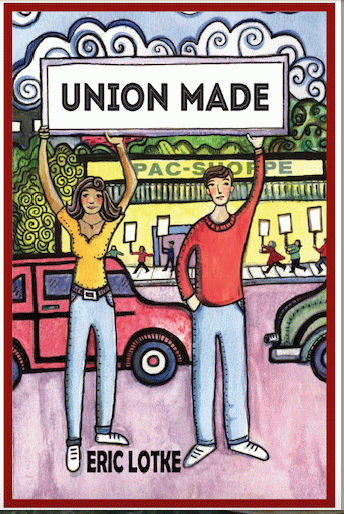My guest today is author, attorney and progressive activist, Eric Lotke. Welcome back to OpEdNews, Eric.
Joan Brunwasser: We haven't spoken for quite a while. Union Made has just been published. Congratulations! Your last two books dealt with prison and our legal system. In Union Made, the relationship between management and the workforce takes the center stage. Why did this become your latest literary foray?
Eric Lotke: I was late to unions. Previous books came from earlier stages of my career, fighting mass incarceration and exploring other ways to keep communities safe. That was good work and I stand by it. But even when we could win a fight against mandatory minimum sentences or a private prison company, the country kept moving in the wrong direction. Inequality rising. Politics broken. The criminal legal system basically unchanged.
What might change it? I came to realize that the only thing that would fix those problems was working people working together. Wait a minute! I realized. That's what unions do. One factory worker alone is powerless - but all the factory workers together can close down the plant and demand a fair share of the profits they help produce.
So I joined the team. I quit my job and went to work for a labor union. A few years later I decided to write a book about it. Partly because I thought people might enjoy the story... and partly because storytelling is part of social movements. That's why I wrote Making Manna about the criminal legal system and now Union Made, a romance about union organizing.
JB: Yes, indeed: Stories make the world go 'round, and you tell them well. Union Made explores how management and employees navigate with and around one another. But the book is not preachy. How did you accomplish that balance?
EL: Thanks! I'm glad you felt that way. I didn't want it to be preachy but readers are the judges.
The book is an exploration. One main character, Nate, is skeptical about unions - like I once was, and like many modern professional Americans still are. Over the course of the book Nate comes to understand what unions are and why they're important. He sees how badly workers are underpaid and the illegal hardball tactics used to keep them down. By the end, even Nate is rooting for the workers - not because of a sermon but because they're right.
We also see the heroism and contradictions of the other main character, Catherine, the union organizer. She's helping the workers take on the corporation and fight for their fair share. But again it isn't a sermon or a fact sheet. Readers live with workers struggling to raise their children on poverty wages, and share their pain when they are fired or hospitalized for organizing to make things better.
JB: Let's talk a moment about the lengths that management will go to keep unions out. As we started this interview, I saw a headline about Amazon's current tactics. Is life imitating art here?
EL: No, art is definitely imitating life. The union busting in the book comes straight from the lived experience of real people in real campaigns. It's much easier for the company to fire the lead organizers than for the organizers to prove why they were fired and litigate it to resolution.
Unions change the power relation between employer and employee, and that's what management hates most: losing power over wages, working conditions, vacation and sick leave, health insurance, shift schedules and everything else.
The intensity of opposition shows the stakes. Employers know unions are popular. Workers want them, and they recognize the power of collective action. That's why employers need to lie and cheat to win. In my book, the company mails employees a postcard with a tombstone and the warning, "Unions kill jobs." In the Amazon campaign, the company adds mandatory "captive-audience" meetings plus anti-union posters in the bathroom.
(Note: You can view every article as one long page if you sign up as an Advocate Member, or higher).







